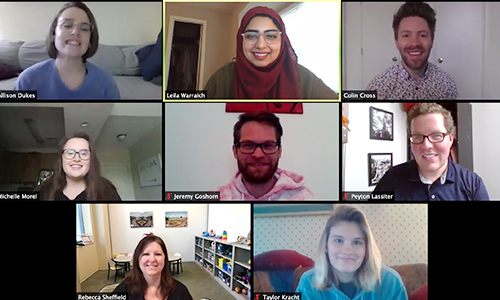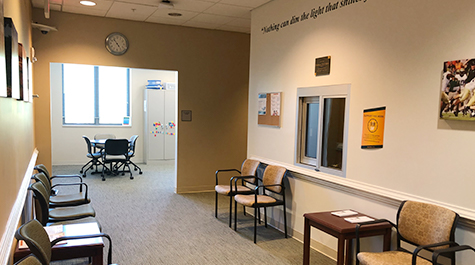Telehealth services allow W&M counseling clinics to meet the demand of students and families in Williamsburg and beyond
During a time when counseling services are needed more than ever, the counseling clinics based in the William & Mary School of Education continue to serve students and families in Williamsburg — though in an unconventional way.
The New Horizons Family Counseling Center serves families from seven school districts across the Peninsula. Master’s and doctoral students in the Couples, Marriage and Family Counseling program at W&M complete their internships in the clinic, where they serve hundreds of families each year.
In the wake of the pandemic, New Horizons has shifted to telehealth services, where digital devices such as phones, tablets and computers connect counselors with clients. The faculty and interns that staff the clinic completed intensive training in preparation for moving their services to telehealth.
The transition to telehealth poses a variety of challenges that might not arise in face-to-face counseling, including dealing with technological malfunctions, the risk of security breaches and attending to the different ethical and legal standards of the digital world. However, it has been a successful transition, says Rebecca Sheffield M.Ed. ’11, Ph.D. ‘17, the clinical faculty director of New Horizons. Sheffield directs the work of the clinic, along with student co-directors Jeremy Goshorn Ph.D. '20 and Leila Warraich Ph.D. '21.
“We’re receiving positive feedback from our counselors and families who are deeply invested in the process.”
The pandemic has changed the focus of recent therapy sessions as families deal with challenges they may have never had before. Finances have been a source of stress as some families have not been able to work. Caregivers have become teachers to their children overnight. As work and school schedules have been uprooted, one of the most common challenges families are facing is trying to find a sense of normalcy and routine, says Warraich.
New Horizons partners with the Williamsburg Health Foundation to run the Youth & Family Development Program, a 10-week intense intervention program that combines family therapy, child groups and parent groups to support families going through particularly difficult challenges such as divorce or the death of family members. “The curriculum is designed to promote improved family communication, collaborative problem-solving and enhancement of social emotional skills,” Sheffield says.
Staff members have been challenged to come up with creative solutions to continue the program, which they are planning to modify to a virtual format this summer.
As for the interns who have helped families transition to telehealth counseling, they have also had to make adjustments as they complete their internships and degrees from home, Warraich says. 
“Our master’s interns and some of our doctoral interns are graduating in May, but it has been incredible to see their commitment and flexibility to continue to provide mental health services for families in a time when the need is now more than ever.”
The same can be said of the interns working in New Leaf Clinic, which uses motivational interviewing to help W&M students and other community clients with substance abuse problems take ownership of their decisions and make positive changes in their lives. One master’s intern, Chuqiu Wu, initiated a partnership with the Office of International Students and Scholars in W&M’s Reves Center to offer support groups to international students after she saw the emotional toll the pandemic was having on them.
The directors of the two clinics teamed up to strategize the process of shifting to telehealth in a way that would provide continuity of care to clients. Social distancing and the move to online classes have introduced major changes in clients’ social and academic lives, as well as the general climate of fear surrounding the virus, says New Leaf Student Co-Director Alex Hilert Ph.D. ’20. Students are adjusting to living at home and finding motivation to continue classwork with the new format, says Student Co-Director Nathaniel Mason M.Ed. ’18, Ph.D. ’21.
“We know isolation can be a major trigger for substance use and our counselors have been tailoring sessions to best help students adjust and cope in healthy ways,” Hilert adds.
The clinic has had its own successes in providing therapy via video teleconferencing, Mason says. Counselors are able to complete paperwork before sessions, which has even allowed more time for creating a therapeutic rapport between counselors and clients.
“The fact that New Leaf does this all virtually is outstanding and not possible without our wonderful faculty support and student interns.”
